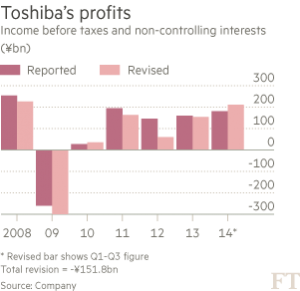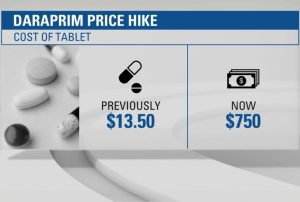There have been a string of speculations, discussions, arguments and discussions over the existence of ethics and the importance of social responsibility in the field of business. While one could be easily swayed by glorious promises, shiny marketing campaigns and tons of fancy speeches, people are largely aware of the said ‘dark’ or ‘negative’ side of business, the unethical side. This brings us to the questions of how or why are unethical business practices taking place? The answer to those questions,in my opinion, would be- Mismanaged expectations. Let’s take for example one of the biggest accounting scandals in Japan that came into media attention in the September 2015.
The 140 year old electronics conglomerate- Toshiba Corp. accepted to overstating operating profits by at least $1.2 billion between 2008 to 2015.[1] Manipulation of company’s profits, understatement of costs, lack of communication etc. serve as a major threat and bane towards healthy transparent business. This overstatement of profits was a cause of massive trouble for the company’s 400,000 shareholders including domestic and international investors, clients and authorities. The main catalyst for this scandal was the intensive target achievement pressure that was mounted on the subordinates by the company’s heads. Post the 2008 global recession, Toshiba’s CEOs put intense pressure on the people working under them to meet targets that were practically impossible to achieve.[2] The employees who were grappling with the pressure that often came right before the end of a quarter or fiscal year, were pushed to postpone losses or push forward sales on accounting, hence inflating the divisional results. Thus, this accounting scandal can be called as the consequence of wrong expectations, and excessive pressure to meet those expectations. Hence, there is a strong relation between behavior of people (ethical or unethical) and what is expected of them.
Another incident that came into light last year, was the 4000% increase in price of a drug called Daraprim by Turing Pharmaceuticals.The CEO, Martin Shkreli,the critical decision maker for this price hike, in an interview with Forbes stated that he was pressured by the company’s board to make the company profitable and that his shareholders expected him to make more profit.[3] In his strive to meet shareholder expectations, the young CEO ignored important social objectives like public welfare and healthcare affordability. The company not only faced immense amount of opposition and negative response for this decision but was also shackled in various legal and political proceedings.[4] At the heart of this wrong move, was yet again a blind chase towards meeting monetary expectations, whose feasibility and future impact remained unchecked. Thus, not only is it important that expectations laid out for a business be realistic and practical, but their consequences must also be weighed correctly.
449 words
References:
[1]- http://www.wsj.com/articles/toshiba-slashes-earnings-for-past-7-years-1441589473
[2]- http://blogs.wsj.com/briefly/2015/07/21/5-things-to-know-about-toshibas-accounting-scandal-2/
[3]- http://time.com/4153512/martin-shkreli-pharmaceuticals-arrested-turing-daraprim/
*image source hyperlinked to image

